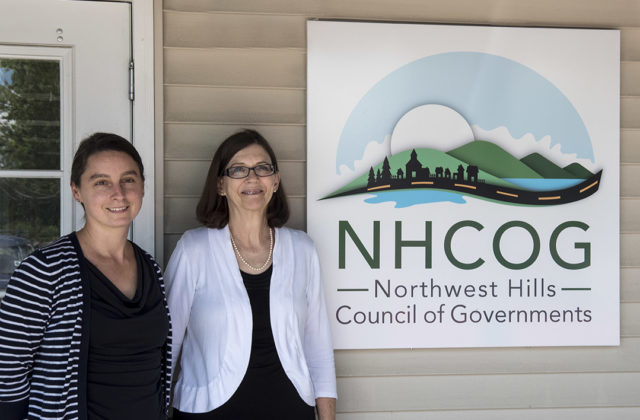Northwest Hills Council of Governments
Collaboration as the Key to Success
By Ruth Melville
In Connecticut, as opposed to most states, the primary unit of local government is not the county but the town. This structure gives more autonomy to each of the 169 towns in the state, but it also makes regional cooperation and planning more difficult. To overcome this problem, in the 1980s Connecticut set up 15 regional planning organizations, which in 2014 were consolidated down to nine.
The regional council for our part of the state is the Northwest Hills Council of Governments (NHCOG), which coordinates efforts in partnership with the elected officials for the 21 towns in its region. Its stated mission is “to make Northwest Connecticut a better place to live, do business, and visit.”
The smallest regional planning agency in the state, NHCOG has only four staff members: Rick Lynn, the executive director; Jocelyn Ayer, the community and economic development director; Joanna Wozniak-Brown, the planning and administrative assistant; and Darlene Krukar, the office manager. The board of directors is made up of the first selectmen or mayors of the 21 towns.
As a major part of its mission, NHCOG holds monthly meetings for these elected officials. Norfolk’s first selectman, Sue Dyer, appreciates this opportunity for the towns to get together to share problems and brainstorm solutions. For example, she mentions that a major topic at the June meeting was the difficulty of coming up with a town budget with the state budget still in flux. Hearing what other towns did, she says, “helped us make our decisions.”
“NHCOG is also an avenue for us to get regional grants,” Dyer says, “and we can buy together things like road salt and plow blades and get a lower rate. Whatever we can do cooperatively, we try to do.” NHCOG also arranges for two hazardous waste collection days a year, disposing of materials the town transfer station can’t handle.
Supporting economic development is another important part of NHCOG’s role. As economic development director of the council, Jocelyn Ayer works closely with economic development commissions (EDCs) in each town.
In 2014, Ayer was instrumental in getting a state grant to hire a consulting team to help eight of the towns, including Norfolk, revitalize their town centers. The consultants, the firm of Goman+York, served as facilitators in the effort to bring the Berkshire Country Store to town, in addition to offering advice on traffic calming and parking. Libby Borden, chair of Norfolk’s EDC, has high praise for Ayer and the support she provides to the towns in her area. “She’s a most extraordinary person. She has a steel rod in her back, she just keeps going.”
Ayer herself thinks much of the credit in this case belongs with Norfolk. “Norfolk has an EDC that actively engaged with the consultants,” she says, adding that “not all towns were as active.” In any attempt to promote regional collaboration, she notes, “we have to have the folks on the ground,” and in Norfolk’s case, “all of the right ingredients came together.”
At its annual economic development summits, NHCOG brings together EDCs and volunteers from various towns. Ayer feels that this meeting is particularly valuable in letting people share success stories: “The great thing about my job is that I get to hear what all these groups are doing. Progress feels slow in each town, but overall progress is being made.”
Other recent projects supported by NHCOG include the creation of a regional trail map, the Northwest Connecticut Regional Food Hub, scheduled to launch July 1, and NWCONNect’s efforts to create a fiber optic network. Housing and transportation issues, too, fall within the council’s remit. Lou Barbagallo, president of the Foundation for Norfolk Living, attends meetings of NHCOG’s Regional Housing Council and praises the group for enabling “a great deal of information sharing and collaboration on housing matters. It has also been quite effective at getting our voices heard at the state level.”
Ayer is currently working on developing a regional plan of conservation and development. The state has a plan, and Norfolk has one, but NHCOG will “focus on the things what can we do more successfully by working together as a region.”
Ayer recently visited every town’s planning and zoning commission, and followed up with an online survey to determine which conservation and development issues were most important to residents. The number one priority, including among Norfolk respondents, was attracting and retaining young people. The other top issues were promoting tourism and local small businesses, and preserving open space and protecting water quality.
The resulting regional plan, which is still in draft stage, sets out strategies to accomplish these goals over the next 10 years. Ayer is planning to present the plan for review and input on June 29, at one of NHCOG’s “5th Thursdays” forums for land use commissions. One strategy will be to create a web-based “toolkit” that each town could access. The toolkit would include examples of regulations, case studies and communication strategies for letting people know how to access housing, jobs, volunteer opportunities and transportation options in their towns.
In fostering regional collaboration, NHCOG offers scattered, individual towns in the Northwest Corner a chance to share knowledge and resources, to the greater benefit of all of them.
Photo, top, of Jocelyn Ayer (left) and Darlene Krukar, by Bruce Frisch.

